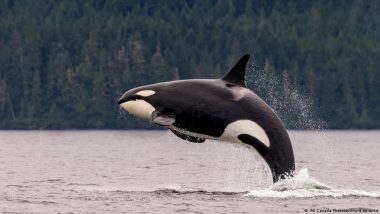Researchers are trying to figure out why groups of orcas regularly damage boats in the Strait of Gibraltar — sometimes even sinking them. Many believe the behavior isn’t aggression, but teenage antics.At first, she says, it was just a single orca jumping out of the water and diving away between the two hulls of the 14-meter sailboat.
Also Read | Scientific Marvel! Israeli Researchers Develop Tool To Predict Extreme Rainfall.
"He seemed to us like a scout," said Amy, a member of the four-person crew aboard the boat passing through the Strait of Gibraltar on its way to Greece.
Also Read | Zaporizhzhia: What Would Happen if There Was an Accident?.
A few minutes later, the animal was back — with several fellow orcas in tow. Five or six of the animals started ramming the boat, Amy says.
"I wasn't afraid at that time," she said.
Amy was unaware of the fact there have been several hundred similar incidents in the same area — some that have resulted in shipwrecks. So far though, no humans have been harmed.
Since July 2020, sailors in the Strait of Gibraltar and along the Atlantic coast of Iberia have reported orca attacks on their boats, behavior that, up to that point, was unusual and rare.
Initially, these attacks were only exhibited by two or three animals. Now experts think that at least 16 members of the Orca Iberica population have taken a liking to the boat-ramming, rubber-blade-biting hobby. Some even pass the boats between each other like balls.
Orcas, also called killer whales, belong to the dolphin family. They live as long as humans and maintain close social contact with their families. Whether in the icy waters of Antarctica or the tropics, in coastal waters or on the open sea, various orca subpopulations exist almost everywhere.
Researchers have found that each population has developed its own food preferences, languages and behaviors. So far, it's only the Orca Iberica population that has developed a preference for ramming boats.
After 20 minutes, the group let go of Amy's boat. But in those 20 minutes, the crew experienced an emotional roller coaster: Fascination at the animals' appearance and sheer power mixed with excitement and anxious questions about how demolished the sailboat might end up.
"I never felt that they were attacking. It felt more like an intergenerational game," Amy said.
Why do orcas ram boats?
Biologist Monika Wieland Shields says Amy's interpretation of the situation is probably the most likely explanation of what was happening that day on the boat.
"If they really were to attack specifically, the damage would be much greater," said the behavioral scientist and director of the Orca Behavior Institute, a scientific organization that researches the behavior of two orca populations off the coast of the US state of Washington.
But some orca scientists think something else is going on.
They hypothesize that the orca behavior is an attempt to take revenge for injustices suffered on the water — orcas have repeatedly been hit by harpoons or injured in other encounters with humans in the past. There is heavy shipping traffic in the Strait of Gibraltar, and the noise could affect the animals. In addition, the Orca Iberica compete with humans for their food source: Tuna.
Until July 2020, however, all this had not caused the animals to inflict targeted harm on humans.
In the 1960s and 70s along the coast of Washington state, juveniles were captured and taken out of the water in front of their mothers' eyes, Wieland Shields says.
"If something would trigger an aggressive reaction, I would have expected it to be such a situation," the biologist said.
But at the time, she added, orcas didn't even touch the human divers swimming among them.
That's not to say that revenge can be completely ruled out as the orca's motivation for ramming the boats. However, Wieland Shields says evidence for the thesis is lacking. Her explanation for the orcas' behavior is based on an observation that behavioral scientists have been making for decades: Orcas have a sense of trends.
In the 1980s, an orca off the coast of Washington state started carrying around a dead salmon on its head. It wasn't long before other whales were adorning themselves with salmon hats as well.
The following year, enthusiasm for the headgear started declining until it finally disappeared completely.
The orcas also frequently use buoys or traps let into the water by shrimp trawlers as toys. For a period of time, many of the animals join in on the play until interest wanes and buoy-sinking goes out of fashion again, says Wieland Shields.
"It seems to be juvenile whales that seem to be engaging in this behavior," the behavioral scientist said.
Curiosity, experimentation and rowdiness that easily overshoots the mark — it's how teenagers act.
"We tend to think we have behaviors that are uniquely human," said Wieland Shields.
But that assumption has often been proven wrong.
"We thought tool use was uniquely human and that culture was uniquely human. And as we study other species, those things drop one by one," the biologist said.
In Wieland Shield's opinion, it is therefore not too far-fetched to draw parallels between young whales and young humans, she says.
Why do orcas become aggressive?
"Their brains are wired for complex emotions," Wieland Shields explains. Curiosity, joy and the instinct to play are as much a part of their emotional spectrum as frustration, fear or anger. The latter is particularly evident in captive orcas.
While there haven't been any documented instances of wild orcas fatally attacking humans, the list of attacks — including some fatal — on humans by captive animals in theme parks like Sea World is long.
For Wieland Shields, the behavior of orcas in captivity also speaks to the complexity of their personalities: While the tolerance level of some animals is high, others are less capable of adapting to life in small concrete tanks and daily training.
What's clear, therefore, to Wieland Shields is that "if the circumstances are intense enough, these anomalous behaviors can be provoked."
For the biologist, however, this also means that if Orca Iberica's plan was indeed to take out the boats and their crews, they would have an easy time of it.
This article is translated from German.
(The above story first appeared on LatestLY on Jun 07, 2023 08:50 PM IST. For more news and updates on politics, world, sports, entertainment and lifestyle, log on to our website latestly.com).













 Quickly
Quickly





















